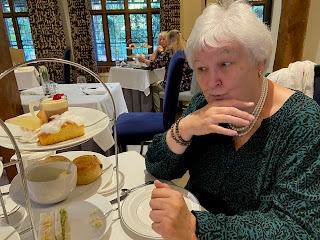My model of Jaguar is based on the Land Rover SUV model with a heavy chassis, four-wheel drive, and a Land Rover 2 litre diesel engine that chuggs along. It is built like a tank, and with the car lock broken, as hard to get into. This is a common problem on this model, but very difficult to fix oneself. It still has some warrenty on it, but the garage that sold it to me said, "Oh, that's a simple problem to fix. It'll be the door lock. You just have to phone the RAC under their scheme and they'll sort it out."
Eventually I got through to the RAC who gave me the number of a local garage that they use. I explained the problem, they said they were busy, so gave me a booking in two week's time. Early on that day, I duly did so having woken Ann early so she could pick me up. Three days later, I phoned them to ask if it had been done yet. "Yes, you can come to collect it," they said, but when I got there, it turned out that all they had done was diagnose the problem (a broken door lock). Now they were waiting for the RAC to respond to authorise the repair, which they explained could take some time, before a further delay while they got the part and booked it in again.
Driving a featureless, basic tank with a broken door was not what I expected after my previous experience of Jags as luxurious cars with every feature imaginable, so we were already considering changing it. Because of this enforced delay in repair, I went to our local garage (Suffolk Trade Centre). The two men who run it, Trevor and Duncan, we have known for many years and have always trusted them. I explained the problem, and Duncan immediately said, "the solenoid breaks in the door lock. It needs a new lock. There's been a lot of delays in getting new Jaguar parts now, but I think they have a stock of locks. Would you like me to order one?"
Then Trevor cut in, saying "how much do you want for the Jaguar? We'll buy it from you as it is." We negotiated a price, I checked with Ann, then said "yes please."
When he took the car for a test drive later, he jiggled the lock half-a-dozen times, and it suddenly started working. "I wish I'd know that," I commented, "you'd better sell it quick."
"No, we won't do that," Trevor explained. "It might be bought by a customer who lives a long way away. We'd then have to loan them a vehicle and bring it back. It would cost us much more than to fix it." A wonderful example of genuine concern for the customer, combined with self-interest.
Yesterday, we took the car into Trevor. As we talked, a police car drew up on the road outside, a policewoman got out and started talking to a man who had been running along the road but now appeared to be sitting under the hedge. They talked for some time before the man suddenly turned into the garage, knocked at the door, and asked in a heavy foreign accent to fill his water bottles. He was short, lean, breathless and sweating, and poorly dressed for running with an old, hooded anorac and heavy shoes. Trevor said, "Of course you can, mate. Are you alright?" then led him to the sink. The policewoman continued standing by the car watching him until he went back to her with his water and was put in the back of the police car.
Trevor wondered if he was an escaped prisoner from the high-security High Point prison, two miles down the road, then told the story from some time ago when he was watching the world cup on the television in their reception room. At half-time he went to the toilet, which was then outside, to find a man sitting there but still fully dressed, who explained apologetically that he just needed time to get his thoughts together. Trevor invited him to rest inside over a cup of tea, and they watched the second half together. Trevor had had a bet on the match, which he won, so at the final whistle he was leaping up and down cheering, with the stranger joining in with evident good humour. But suddenly, the man left abruptly without saying thank you or even goodbye.
His suspicions aroused, Trevor checked on the High Point Facebook page, and there was a picture of the man, an escaped prisoner. In this case however, even as we were sitting there, the police car came back, the two policewomen came in and explained he wasn't an escapee, but if he appeared again, to let them know. So it was an eventful day full of excitement, as well as selling our car. Now I am carless, so we just need to find a new one.























